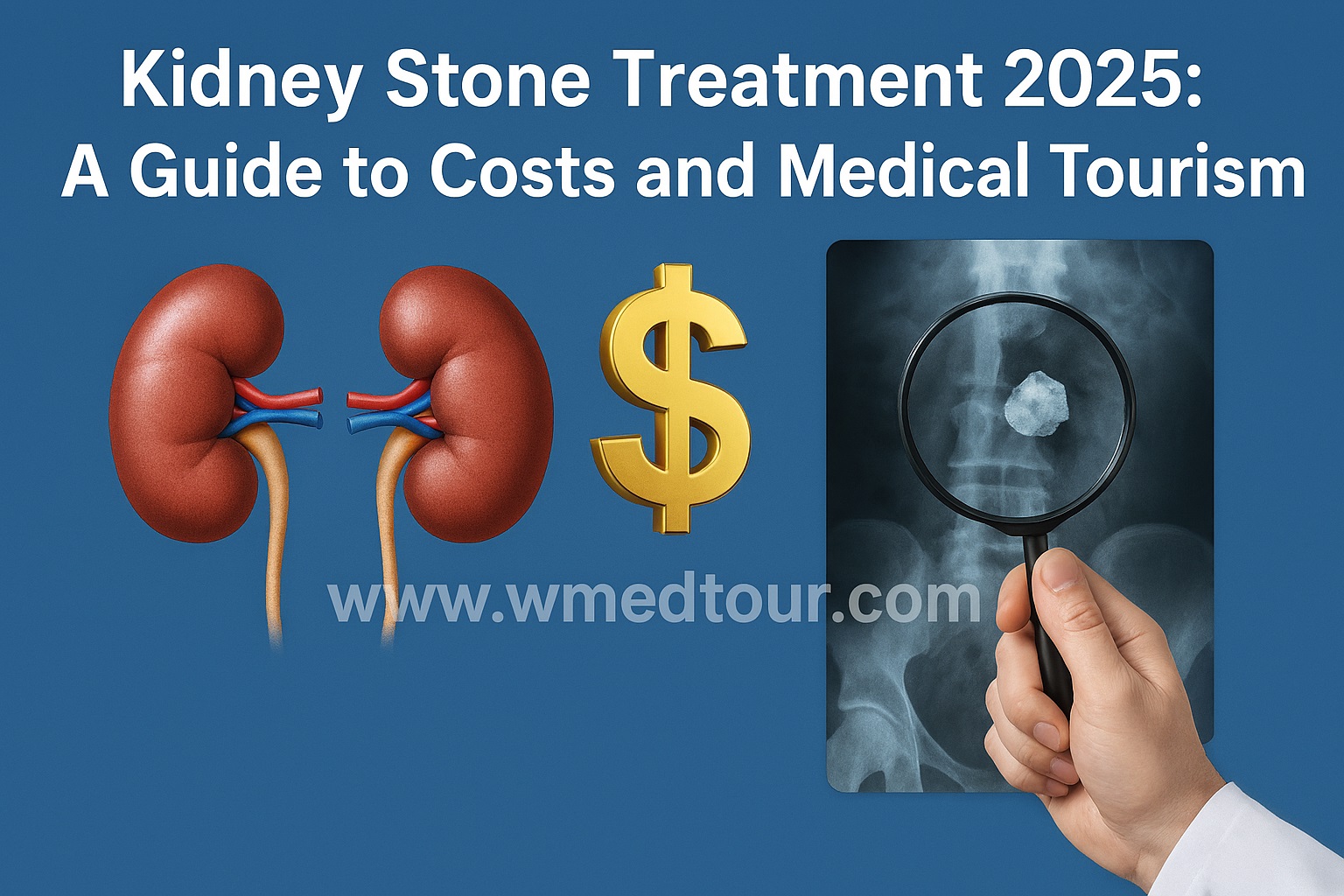Kidney Stone Treatment: A Guide to Costs and Medical Tourism
Living with the pain of kidney stones can be a debilitating experience, impacting every aspect of your life. Thankfully, modern medicine offers a range of highly effective options for kidney stone treatment. This comprehensive guide will walk you through everything you need to know about kidney stones, their symptoms, and the various treatment methods available. In addition, we will explore how medical tourism, through a trusted provider like Wmedtour, can offer a viable and affordable path to receiving high-quality, professional **kidney stone treatment** and care. Our goal is to empower you with knowledge, ensuring you can make the best decision for your health and financial well-being.
What Are Kidney Stones? Understanding the Basics
Kidney stones, also known as nephrolithiasis, are hard deposits made of minerals and salts that form inside your kidneys. They can vary in size, from as small as a grain of sand to as large as a pearl. Sometimes, these stones stay in the kidney and cause no symptoms, but often, they travel down the urinary tract, leading to significant pain. This is a very common condition, and millions of people worldwide seek **kidney stone treatment** every year. While some small stones may pass on their own, larger stones often require medical intervention.
Recognizing the Symptoms of Kidney Stones
Recognizing the symptoms of kidney stones is crucial for timely diagnosis and **kidney stone treatment**. The pain, often referred to as renal colic, is typically severe and comes in waves. It can start in your back or side and move to the lower abdomen and groin as the stone travels. Other common symptoms include blood in your urine, a persistent need to urinate, and pain or burning during urination. You might also experience nausea, vomiting, or a fever and chills if an infection is present. If you suspect you have kidney stones, it’s essential to seek professional medical advice immediately. Early and accurate diagnosis is the first step toward effective **kidney stone treatment**.
Effective Treatments for Kidney Stones
The type of **kidney stone treatment** you receive depends on the size and location of the stone. For smaller stones, your doctor may recommend drinking plenty of water and taking pain medication to help them pass naturally. However, for larger stones or those causing severe symptoms, more advanced medical and surgical procedures are necessary. These include minimally invasive techniques that break up or remove the stones. For instance, extracorporeal shock wave lithotripsy (ESWL) uses sound waves to break the stones into tiny fragments that can pass more easily. In fact, ESWL is a very common non-invasive form of **kidney stone treatment**.
Advanced Surgical Options for Large Stones
For stones that are too large for ESWL, your urologist may recommend a surgical procedure. One common method is Ureteroscopy (URS), where a thin, lighted scope is passed through the urethra and bladder into the ureter to locate and break up the stone. Another effective **kidney stone treatment** is Percutaneous Nephrolithotomy (PCNL), which is a minimally invasive procedure used to remove large stones directly from the kidney through a small incision in the back. These procedures are highly effective and are performed in our partner hospitals by skilled surgeons. The Urology Care Foundation provides excellent resources on these procedures.
Ready to Find the Best Kidney Stone Treatment?
If you or a loved one are suffering from kidney stones, don’t let the cost of treatment be a barrier to your health. Wmedtour specializes in providing world-class healthcare solutions at a fraction of the price you would find at home. Our team of professional doctors and top hospitals are ready to guide you on your journey to better health. We offer a full range of medical tourism services, from consultation to post-operative care. Ultimately, your health is our priority.
Kidney Stone Treatment Costs: A Global Comparison
When you are considering a major medical procedure like kidney stone removal, understanding the costs is absolutely vital. In many countries, the price of these procedures can be prohibitively high, which is why medical tourism has become a popular choice. The costs can vary dramatically based on the country, the hospital’s reputation, the surgeon’s expertise, and the specifics of the procedure itself. We have compiled a table with estimated costs to help you compare options in some of the most popular medical tourism destinations. This table is an excellent starting point for your research. In fact, it provides a clear picture of the potential savings you can realize by choosing to travel for your **kidney stone treatment**. We believe in providing transparent pricing so you know exactly what to expect.
Estimated Costs for Kidney Stone Treatment in Popular Medical Tourism Destinations (USD)
| Country | Estimated Cost (USD) | Key Advantages |
|---|---|---|
| Iran | $1,500 – $3,500 | Offers incredibly competitive prices and boasts highly-skilled surgeons. |
| India | $2,500 – $5,000 | Known for JCI-accredited hospitals and a large number of English-speaking doctors. |
| Turkey | $3,000 – $6,000 | Combines world-class medical technology with a convenient location for travelers from Europe and Asia. |
As you can see, the financial savings for a quality **kidney stone treatment** are substantial. This allows you to invest in your health without the financial burden. Therefore, it’s wise to explore all your options and consult with a specialist. Our goal is to make these life-changing treatments accessible to everyone who needs them. We also have expertise in other medical fields, including Urology & Nephrology, Cardiac Surgery, and Plastic Surgery. The National Institute of Diabetes and Digestive and Kidney Diseases (NIDDK) offers additional information on kidney stones.
How to Plan for Your Kidney Stone Treatment Abroad
Planning for a medical journey can feel overwhelming, but a simple, step-by-step approach can simplify the process. Ultimately, it’s all about preparation. Our Urology services are designed to help you navigate this process smoothly. First and foremost, you should consult with your local doctor to confirm your diagnosis and treatment needs. This is a very important first step. Next, contact a trusted medical tourism facilitator like Wmedtour to receive a personalized consultation and a quote for your desired procedure. After that, you will send your medical records for a thorough review by our expert team. Once a treatment plan is created, we assist you with all the logistics, from visa applications to accommodation and airport transfers. This ensures a stress-free experience from start to finish. Finally, after the procedure, you can recover in comfort before returning home. Therefore, by planning ahead, you can receive the care you need without any complications.
How to Prepare for Kidney Stone Treatment
A step-by-step guide for international patients planning to undergo medical treatment for kidney stones in a foreign country.
Step 1: Get a Diagnosis from Your Local Doctor
Before you travel, it is crucial to have a clear diagnosis from your local doctor. This includes imaging tests and lab results that confirm the presence of kidney stones and their size and location.
Step 2: Contact a Medical Tourism Facilitator
Get in touch with a reputable medical tourism facilitator like Wmedtour. Provide them with your medical records to get a comprehensive and transparent cost estimate for your **kidney stone treatment**.
Step 3: Review the Treatment Plan
Our team of specialists will review your medical records and create a personalized treatment plan. You can then discuss and approve the plan before proceeding. This ensures you are fully informed about your **kidney stone treatment**.
Step 4: Arrange Travel and Logistics
Your facilitator will assist with all travel arrangements, including booking flights, securing visas, and arranging your accommodation and transportation in the host country.
Step 5: Undergo Treatment and Recovery
Arrive in the country and begin your treatment. The facilitator will provide support throughout your hospital stay and during your initial recovery period, ensuring a smooth process. The World Health Organization (WHO) has information on kidney diseases.
Frequently Asked Questions About Kidney Stones and Treatment
What is the main cause of kidney stones?
The most common cause of kidney stones is dehydration. When you don’t drink enough fluids, urine becomes concentrated with minerals and salts, which can crystallize and form stones. Other factors like diet, obesity, and certain medical conditions can also play a role.
What are the different types of kidney stones?
There are four main types of kidney stones: calcium oxalate (most common), uric acid (often associated with high protein intake), struvite (linked to urinary tract infections), and cystine (a rare, inherited type). Your **kidney stone treatment** depends on the type of stone you have.
How can I prevent kidney stones from forming?
The best way to prevent kidney stones is to drink plenty of fluids, especially water. This helps dilute the substances in your urine that lead to stone formation. Additionally, your doctor might recommend dietary changes, such as reducing sodium and animal protein intake.
Is lithotripsy painful?
Extracorporeal shock wave lithotripsy (ESWL) is a non-invasive procedure that can cause some discomfort, but it is typically performed with sedation or light anesthesia to manage the pain. Afterward, you may experience minor bruising and some blood in the urine as the stone fragments pass. The post-procedure pain is part of the **kidney stone treatment**.
What is the recovery time for kidney stone surgery?
The recovery time depends on the type of procedure. For minimally invasive procedures like URS, most people can return to normal activities in a few days. For PCNL, which is more invasive, recovery may take a week or two. Your doctor will provide specific guidelines based on your **kidney stone treatment**.
Does medical tourism provide a complete solution for my health needs?
Yes, a good medical tourism provider like Wmedtour offers a comprehensive solution. They coordinate your entire trip, including flights, accommodation, hospital appointments, and post-operative care, ensuring a seamless experience for your **kidney stone treatment**.
Is a diet high in calcium bad for kidney stones?
For most people, a diet high in calcium does not cause kidney stones. In fact, a diet low in calcium can actually increase the risk of stone formation. The best approach is to consume a balanced diet and to consult with a doctor for personalized dietary advice, which is part of your **kidney stone treatment** plan.
What is the difference between a urologist and a nephrologist?
A urologist is a surgeon who specializes in the urinary tract (kidneys, bladder, etc.) and male reproductive system. A nephrologist is a doctor who specializes in kidney diseases that don’t require surgery. For kidney stones, a urologist is typically the specialist for surgical and procedural treatments.
Are there any natural remedies for kidney stones?
While some people try natural remedies like lemon juice, apple cider vinegar, or cranberry juice, these are not scientifically proven to dissolve existing stones. For a definitive **kidney stone treatment**, it is best to rely on proven medical methods and consult with a professional.
What is a stent, and is it used in kidney stone treatment?
A stent is a small, hollow tube placed temporarily in the ureter to keep it open and allow urine and stone fragments to pass. It is often used after procedures like Ureteroscopy (URS) to help with drainage and reduce swelling. Removing the stent is the final step in this type of **kidney stone treatment**.
What are the warning signs of a severe kidney stone complication?
You should seek immediate medical attention if you experience symptoms like a high fever, chills, or difficulty urinating. These could indicate a severe infection or a complete urinary blockage, which are medical emergencies that require immediate **kidney stone treatment**.
Why is the cost of kidney stone treatment so much lower in Iran or India?
The primary reason for the lower cost is a lower cost of living and operational expenses, including labor, infrastructure, and hospital overhead. These countries also have a strong medical tourism market, which encourages competitive pricing without compromising on the quality of care or the **kidney stone treatment** itself.
Does health insurance cover my treatment abroad?
Most domestic health insurance policies do not cover medical procedures performed internationally. However, some international health insurance plans may offer coverage. It is essential to check with your insurance provider to understand your policy’s specifics regarding **kidney stone treatment** abroad.
Is it safe to fly after kidney stone surgery?
It is generally safe to fly after minimally invasive kidney stone procedures, but you should always consult with your surgeon first. They will advise you on the best time to travel based on your recovery progress and the specifics of your **kidney stone treatment**.
What are the different stages of kidney stone pain?
Kidney stone pain often begins as a dull ache in the back or side. As the stone moves into the ureter, the pain intensifies, often described as a sharp, cramping pain that comes in waves. The pain typically subsides once the stone passes or is removed through **kidney stone treatment**.
Can all kidney stones be treated with non-invasive methods?
No. While many stones can be treated with methods like ESWL, some are too large, or their location makes them difficult to target. In these cases, a surgical **kidney stone treatment** like URS or PCNL is required. Your urologist will recommend the best course of action based on your specific case.
How does a medical tourism company like Wmedtour ensure quality?
Wmedtour ensures quality by partnering with internationally accredited hospitals and highly experienced surgeons. We perform due diligence to ensure that the medical standards are top-notch and that you receive the best possible **kidney stone treatment** for a fair price.
What is the role of the surgeon in this process?
The surgeon is a critical part of the **kidney stone treatment** process. They perform a thorough evaluation, discuss all potential treatment options, and then perform the procedure itself. An experienced surgeon is key to a successful outcome and a smooth recovery.
What happens if a kidney stone is left untreated?
Leaving kidney stones untreated can lead to severe pain, a urinary tract infection, or a blockage of the ureter. In rare cases, this can lead to kidney damage. Early diagnosis and **kidney stone treatment** are essential to prevent these complications.
How can Wmedtour help me decide on a destination?
Wmedtour provides detailed information on our partner hospitals and surgeons in each country. Our medical advisors will work with you to understand your specific needs, budget, and travel preferences to help you choose the best destination for your **kidney stone treatment**.
- bimehhakimi
- September 6, 2025
- 7:41 am
- No Comments




